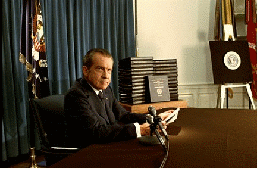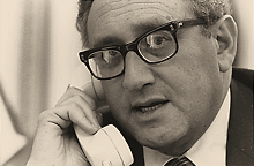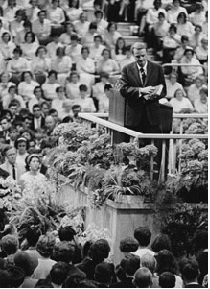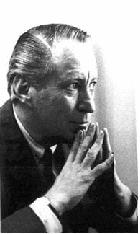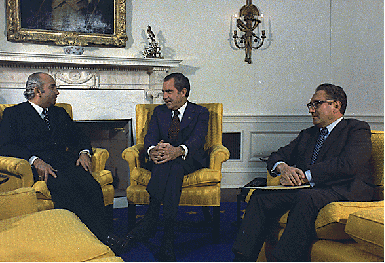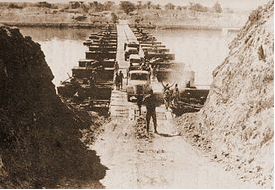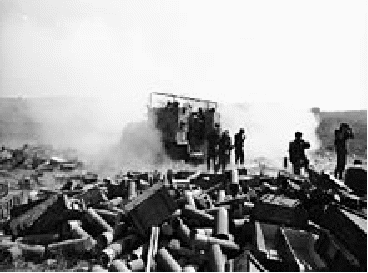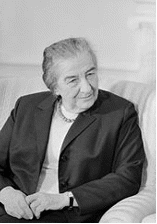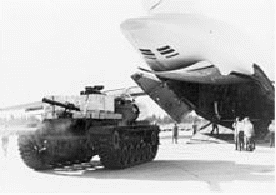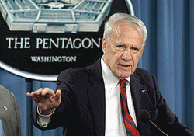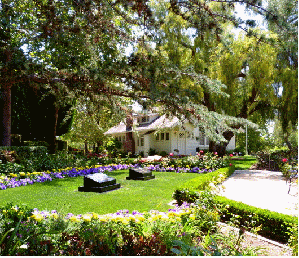| |
August 2012 |
| Search our
|
Richard Nixon - Henry Kissinger The Anti-Semite who saved Israel By Jerry Klinger
“If you are not for me, you must be against me. If you are against me, you must be an anti-Semite.
- Chandler Rabinowitz “In the end, a Jew is a Jew, is a Jew.” Hans Herzl, son of Theodor Herzl, in his final letter before he committed suicide
Richard Milhous Nixon(January 9, 1913 – April 22, 1994) was the 37thPresident of the United States. He served from 1969 to 1974. Nixon has been the only president to resign the office. He had previously served as a US representative and senator from California and as the 36thVice President of the United States from 1953 to 1961. Nixon was born in Yourba Linda, California but grew up in the small, Quaker town of Whittier, California. His parents, themselves Quakers, poor but hard working people wanted to be near family. Nixon worked hard, graduating public school and Whittier College with honors. He went on to Duke Law School where he once again excelled. Graduating in 1937, Nixon sought work in New York. Nixon was discriminated against by New York’s establishment who felt he was nothing but a small time Californian imposing himself where he did not belong. It was a personal slight that pricked his sense of self that he never forgot. He returned to Whittier and practiced small town law until World War II brought him back to Washington and then to military service. He ran successfully for Congress and later the U.S. Senate in hard, mudslinging elections. It was the Alger Hiss Case, during the Joseph McCarthy era of Red Baiting, that established his reputation as a leading anti-communist. Nixon was catapulted to national attention and political prominence by the new, powerful mass media of television. Dwight D. Eisenhower, the Republican Party presidential nominee in the 1952 election, chose Nixon to be his vice presidential running mate. Nixon served as vice president for eight years. Running on his own as the 1960 Republican Candidate for president, Nixon lost the extremely narrow election to John F. Kennedy. Many attributed Nixon’s loss to television’s unintentional physical projection of Nixon as dark and swarthy during the first ever televised presidential debates opposite the young photogenic Kennedy. Two years later, 1962, Nixon ran for and lost the California gubernatorial race. Returning to the national political arena, he defeated Hubert Humphrey for the presidency in 1968. President Lyndon Johnson, severely damaged politically by the extremely unpopular Viet Nam war, declined to run for reelection. Nixon succeeded in ending the US involvement in the Vietnam War in 1973. Nixon, the staunch anti-communist Conservative, visited the People's Republic of China in 1972 opening diplomatic relations between China and the United States. Nixon initiated détente and the Anti-Ballistic Missile Treaty with the Soviet Union the same year. He began wars on cancer and drugs, imposed wage and price controls to fight inflation, enforced desegregation of Southern schools and established the Environmental Protection Agency. Nixon's second term suffered an Arab oil embargo, a direct result of the 1973 Arab-Israeli war, and the resignation of his vice president, Spiro Agnew. Enmeshed in the cover up of the infamous, Watergate scandal, an unauthorized by him botched effort by Nixon senior staff and advisors to burglarize the Democratic National Committee Headquarters, Nixon resigned the presidency in disgrace to avoid impeachment, August 9, 1974. Nixon was succeeded by his vice president, Gerald Ford, who quickly and controversially, pardoned Nixon for any criminal wrongdoing. Few people knew of Nixon’s near pathological, anti-Semitic hatred of Jews, until the scandalous evidence was confirmed by Nixon’s own secret audio taping of conversations in the Oval Office. Nixon’s paranoid recordings, discovered at the time of the Watergate Hearings, were to prove his downfall. Nixon had long been convinced that political opposition was tantamount to being a political enemy. Jews, in particular, because of their strong, myopic voting bloc linkage to the Democrat party were considered by him as suspect and enemies. Jews voted and vote consistently, almost by rote by very significant, influential margins, for Democrat candidates, with seemingly mindless predictability. Jewish loyalty to the Democrat Party was forged by Franklin Roosevelt during the New Deal and the dark days of the Great Depression. Roosevelt opened governmental access to Jews on a historically unprecedented level. The liberal, progressive Democrat agenda was a further affirmation of possible emerging acceptance of Jewish Americans and their integration into American life. It was exemplified by President Wilson’s nomination of Louis Brandeis to the U.S. Supreme court twenty years earlier. Amazingly for Jews, religious toleration was rarely an institutionalized issue in America. Jewish orthodox religious identification declined as Jewish acceptance grew. Future Salvation and Redemption became far less important to most American Jews than the incredible possibilities of the here and now of American life. Always aware of their historic minority status, oppressed by millennia of State, Church and societal anti-Semitism, Jews in America were and are free to focus on economic, social and political equality to safeguard their futures. Jews joined with liberal progressives, voting as self-interested blocs, for who and what was best for the Jews. The rational was simple. If the majority interests in American could be shaped to protect minorities, even if it was not in the majority’s interest to do so, the Jews would be safe. Jews repaid the perceived support of the Democrat Party for their interests with their own, multi-generational support for Democrat candidates, policies and power. It is precisely the tension of multiple American political constituencies, struggling together within the deliberately limiting framework of the U.S. Constitution that has protected Jewish interests. The weakening of Constitutional constraints and Jewish sublimation into the Balkanized majority cobbled together by political demagogues that is becoming their greatest threat. The irony of Jewish support for Roosevelt was that Roosevelt was himself a pernicious anti-Semite. He was a Patrician anti-Semite. As the Holocaust and its horrors unfolded, Roosevelt stubbornly chose not to make saving Jewish lives a priority or even a consideration until very late in the war. He was finally forced to pay lip service to the Holocaust but by then nearly all the 6,000,000 were dead. Historic records indicate that Roosevelt was not going to recognize the State of Israel being born at the United Nations in 1948. Roosevelt’s death changed the course of history. The Jewish establishment did not wish to rock their relationship with Roosevelt. They feared raising the hoary head of the anti-Semitic cry, the war was being fought and Christian blood was being spilled for Jewish interests. Establishment Jewry deemed it better to remain quiet. They remained quiet except to attack their own Cassandras crying out that the Holocaust was happening. Establishment Jewry attacked, with particular viciousness, the Bergson Group led by Hillel Kook. Amongst the members of the Bergson group were Ben Zion Netanyahu, the father of Israel’s Prime Minister Benjamin Netanyahu, Col. John Henry Patterson, a British Christian military officer and former commander of the Jewish Legion in World War I, and Ben Hecht, the famed Jewish American film and play writer. The Bergson group was not reluctant to attack Roosevelt’s callous inactivity to mitigate the Holocaust. American establishment Jewry remains very protective of President Roosevelt. They were and are the opposite with Republicans and Richard Nixon in particular. There is a second great irony of Jewish Presidential relations. American Jewry was right and wrong about Richard Nixon. The Nixon Watergate Tapes confirm that Richard Nixon was an anti-Semite. He was subject to the same false anti-Semitic stereotypical bigotry that many major American leaders, political and religious, shared in common but privately. Famed American Evangelist, Billy Graham, unbeknownst to Rev. Graham, was recorded on one of the tapes. The Nixon-Graham remarks were recorded after a prayer breakfast on Feb. 1, 1972.
Rev. Billy Graham “Rev. Billy Graham openly voiced a belief that Jews control the American media, calling it a "stranglehold" during a 1972 conversation with President Richard Nixon, according to a tape of the Oval Office meeting released Thursday by the National Archives. "This stranglehold has got to be broken or the country's going down the drain," the nation's best-known preacher declared as he agreed with a stream of bigoted Nixon comments about Jews and their perceived influence in American life. "You believe that?" Nixon says after the "stranglehold" comment. "Yes, sir," Graham says. "Oh, boy," replies Nixon. "So do I. I can't ever say that but I believe it." "No, but if you get elected a second time, then we might be able to do something," Graham replies. Later, Graham mentions that he has friends in the media who are Jewish, saying they "swarm around me and are friendly to me." But, he confides to Nixon, "They don't know how I really feel about what they're doing to this country." …Haldeman's diaries noted the conversation. He wrote that there was discussion "of the terrible problem arising from the total Jewish domination of the media, and agreement that this was something that would have to be dealt with." He continues, "Graham has the strong feeling that the Bible says there are satanic Jews and there's where our problem arises." …After offering Nixon tips on preparing himself for big speeches, as well as strategy for his re-election campaign, Graham notes that he has been invited to lunch with editors of Time magazine. "I was quite amazed since this is the first time I've heard from Time since [Time founder] Henry Luce died." "You meet with all their editors, you better take your Jewish beanie," Haldeman says. …Nixon then broaches a subject about which "we can't talk about it publicly," namely Jewish influence in Hollywood and the media. He cites Paul Keyes, a political conservative who is executive producer of the NBC hit, "Rowan and Martin's Laugh-In," as telling him that "11 of the 12 writers are Jewish." "That right?" says Graham, prompting Nixon to claim that Life magazine, Newsweek, The New York Times, the Los Angeles Times, and others, are "totally dominated by the Jews." He calls network TV anchors Howard K. Smith, David Brinkley and Walter Cronkite "front men who may not be of that persuasion," but that their writers are "95 percent Jewish." Nixon demurs that this does not mean "that all the Jews are bad" but that most are left-wing radicals who want "peace at any price except where support for Israel is concerned. The best Jews are actually the Israeli Jews." "That's right," agrees Graham, who later concurs with a Nixon assertion that a "powerful bloc" of Jews confronts Nixon in the media. "And they're the ones putting out the pornographic stuff," Graham adds. Nixon contends that "every Democratic candidate will owe his election to Jewish people," but he won't. Haldeman turns the subject to the White House press corps and the Gridiron Club, a bastion of the media establishment, both of which they say were mostly WASP once, but no more. "It was the Merriman Smiths, the Dick Wilsons, the [James] Kilpatricks, all that kind of people. But you look at what covers the president today and it's really kind of scary," Haldeman says. Haldeman and Nixon cite by name reporters from the Los Angeles Times (David Kraslow), New York Times (Max Frankel), Washington Post (Stanley Karnow) and NBC (Herb Kaplow) but stumble on CBS. "From CBS, Rather, Dan Rather, is Rather?" says Haldeman. A deletion then follows with the next voice heard being that of Graham, who alludes to A.M. Rosenthal, managing editor of The New York Times. "But I have to lean a little bit, you know. I go and see a friend of Mr. Rosenthal at The New York Times, and people of that sort. And all, I don't mean all the Jews, but a lot of the Jews are great friends of mine. They swarm around me and are friendly to me. Because they know I am friendly to Israel and so forth. They don't know how I really feel about what they're doing to this country." Nixon says, "You must not let them know." The conversation turns to religious magazines, postal rates and Nixon's uncharitable thoughts on certain Cabinet members. Graham then leaves and, a few minutes later, Nixon tells Haldeman, "You know it was good we got this point about the Jews across." "It's a shocking point," says Haldeman, a frequent cheerleader during Nixon's diatribes. "Well," says Nixon, "it's also, the Jews are irreligious, atheistic, immoral bunch of bastards." 1 “When the tapes were made public, Graham apologized and said, "Although I have no memory of the occasion, I deeply regret comments I apparently made in an Oval Office conversation with President Nixon ... some 30 years ago... They do not reflect my views and I sincerely apologize for any offense caused by the remarks.”According to Newsweek magazine, "The shock of the revelation was magnified because of Graham's longtime support of Israel and his refusal to join in calls for conversion of the Jews.”2 Nixon used the power of the Federal government to find his enemies. He focused special attention to finding, harassing, or possibly destroying his Jewish enemies. Marvin Kalb, a Jewish journalist, wrote a negative expose book on Nixon, the Nixon Memo, with a definite supplemental bent to prove Nixon’s anti-Semitic motives. Kalb told how Nixon authorized the Internal Revenue Service to harass him. The CBS office at the State Department was twice ransacked by unknown men looking for any possible classified information that Kalb may have used illegally to write his book on Nixon. Nixon used the IRS to investigate other wealthy Jews as well who were not his supporters. The problem with the book was that it showed a President intent on going after his enemies but nothing that was anti-Semitic in character. One damning piece of evidence did emerge as one of the impeachment articles against President Nixon. Nixon, manically, was searching for the source of leaks to the Washington Post about Watergate. He demanded that key Federal Bureaucracies be investigated and all the Jews to be specifically identified for possible inclusion on his enemies list. It was a clear potential violation of law if carried out. It was a clear anti-Semitic directive. But…the Jews were also wrong about Nixon and the Republicans. David Twersky, the Editor in Chief of the New Jersey Jewish News wrote about the enigmatic Nixon.3
Leonard Garment
Egyptian foreign minister Ismail Fahmi, left, Richard Nixon, Henry Kissinger, a week after the end of fighting in the Yom Kippur War Heinz Alfred "Henry" Kissinger was born May 27, 1923 in Furth, Bavaria, Germany. His family were German Jews. In 1938, the Kissinger family fled Nazi Germany and settled in New York’s Jewish immigrant community of Washington Heights. He began his college education at City College until he was drafted into the U.S. Army in 1943. Kissinger saw combat in Europe. His superior intellect, administrative ability and fluency in German became particularly useful when he was assigned to U.S. Military intelligence and de-Nazification efforts after the war. Returning to the States, Kissinger received his A.B. degree summa cum laude in political science from Harvard University, 1950. He completed his M.A. and Ph.D. at Harvard by 1954. Kissinger remained at Harvard as a faculty member but continued to seek ways to advance his principle interest, Foreign Affairs. Over the next ten years he was associated with the National Security Council, the Council on Foreign Relations, the Operations Research Office, the Arms Control and Disarmament Agency, the Department of State, the Rand Corporation and most importantly, the Rockefeller Fund. When Nelson Rockefeller, the Governor of New York sought the Republican nomination for President in 1960, 1964 and 1968, Kissinger was already a man of influence and connections within the Republican Party. After Richard Nixon won the 1968 Presidential campaign, he appointed Kissinger his National Security Advisor. Kissinger was the first Jew to hold that important advisory position. “With Nixon’s
approval, Kissinger concentrated foreign policy-making power within the
White House under the National Security Council, circumventing the
established foreign affairs bureaucracy and effectively curtailing the
authority of Secretary of State William Rogers. Nixon and Kissinger
both favored "back-channel" communications and used secret negotiations
to lay the groundwork for détente with the Soviet Union and open a new
dialogue with Communist China. Similarly, Kissinger began secret talks
with North Vietnam in 1969 in the hopes of reaching a settlement to the
Vietnam War. At the same time, though, he counseled Nixon to increase
bombing of North Vietnam and to expand the war into Cambodia and
Laos. Reflecting back on Kissinger’s years as a Foreign Policy Advisor to Presidents Nixon and Ford, and being the first Jewish Secretary of State, his influence was dramatic. Kissinger was a proponent of Realpolitiks– recognition of the Soviet Union’s interests as a rival superpower as opposed to ideological anti-Communism. He sought areas of commonality and cooperation with the Soviets – a policy known as détente. He opened the doors to American-Chinese relations which have since become economically central to American contemporary life. Other decisions he made were very controversial. Kissinger’s decision to bomb Cambodia and North Vietnam, while negotiating peace, raised strong objections to his having received the Nobel Peace Prize. For Jewish Americans and Jews worldwide, two Kissinger – Nixon decisions were vitally important. “In 1973, Kissinger did not feel that pressing the Soviet Union concerning the plight of Jews being persecuted there was in the interest of U.S. foreign policy…Kissinger argued, however: “That emigration existed at all was due to the actions of “realists” in the White House. Jewish emigration rose from 700 a year in 1969 to near 40,000 in 1972. The total in Nixon’s first term was more than 100,000. To maintain this flow by quiet diplomacy, we never used these figures for political purposes… The issue became public because of the success of our Middle East policy when Egypt evicted Soviet advisers. To restore its relationship with Cairo, the Soviet Union put a tax on Jewish emigration. There was no Jackson-Vanik Amendment until there was a successful emigration effort. Sen. Henry Jackson, for whom I had, and continue to have, high regard, sought to remove the tax with his amendment. We thought the continuation of our previous approach of quiet diplomacy was the wiser course…Events proved our judgment correct. Jewish emigration fell to about a third of its previous high. “4 The second decision was, without exaggeration, or understatement, life or death for Israel. October 6, 1973, Yom Kippur, Israel was attacked by the combined armies of Egypt and Syria. It was the High Holiday, the single most important day on the Jewish religious calendar. Israeli High Command traditionally has given the vast majority of the Defense Forces the holiday off to return to their homes, to synagogue if they chose. This Yom Kippur was no different. Israeli intelligence was comfortable that, though Arab preparations for some sort of action were easily visible across the Canal, nothing was expected to happen. Political, military leadership cockily expected they would be able to beat back any Arab attack. The ’67 War’s lopsided victory was arrogantly a part of even the lowest private’s psyche. The “surprise” Arab attack confirmed a colossal failure of Israeli intelligence. In well planned, and initially well executed operations, Egyptian forces crossed the Suez Canal annihilating the
Egyptians cross the canal thin Israel manned positions. In the 53 minute Egyptian cannonade followed by the assault, the famous Bar-Lev line melted into the Canal, in parts literally.5The Egyptians quickly advanced well into the East Bank of the Sinai. Thirty two thousand Egyptian soldiers attacked 435 Israeli defenders along the entire canal. In the North, 800 Syrian tanks faced 180 Israeli tanks on the Golan. 28,000 Syrian infantry and artillery punched holes in Israeli lines defended by 3,000 soldiers. Earlier, September 25, King Hussein flew his own helicopter to Jerusalem before the war broke out. He personally warned Golda Meir war was imminent. He just did not know the exact day. Golda and her generals were not convinced. They discounted the warnings. They ignored the warnings. Initial Egyptian and Syrian assaults were devastating. The Arabs were elated. The fears of the Arab fighting man morphed. The myth of Israeli invincibility was crushed. Arab soldiers trained and well equipped with vision and purpose could and were defeating Israel. Israel was not prepared to fight the new style war that Soviet arms had provided for the Arabs. Israel countered as best as possible. It became very apparent, very early on, that the heavy Israeli losses of aircraft, tanks, and trained men, were not sustainable. From the beginning, Arab forces were double anything Israel could muster, an estimated 3,500 Arab tanks vs. 1,700 Israeli tanks, 1,100,000 Arab fighting men vs. Israel’s 400,000, and 1100 Arab aircraft vs. Israel’s 440. Attacking Arabs, victoriously and aggressively, pushed their advance in the first days. Arab losses were staggering but Israeli aircraft, tanks, were being destroyed at an incredible rate. Israeli supplies, weapons, bullets and canon shells were being rapidly depleted.
Israeli shell casings - Golan Nearly ˝ of all the Israeli aircraft destroyed in the Yom Kippur war were destroyed in the first three days of fighting according to Moshe Dayan. Israeli war materials were being used up so fast the Command understood they could run out. Considerations began on how to hoard supplies, and defer some actions. They needed to have material reserves to defend the cities if the Arabs could not be stopped. They would need the remaining reserves to try and save the people of Israel. Fear of the extermination of the Jewish State was real. Israeli leadership considered the end of Israel. During the night of October 8-9, Moshe Dayan, the one eyed hero of the ’67 war, deeply alarmed, told Prime Minister Golda Meir, “this is the end of the third temple.” Golda reputedly, but never confirmed or acknowledged, gave permission for the ultimate response when faced with the Second Holocaust – the assembly and preparation of nuclear weapons.
Israeli Prime Minister Golda Meir Israel turned to the United States, in desperation. Golda Meir had made the wrenching decision, in the few hours before the war actually began, not to strike the Arabs in any preemptive attack, as they had in 1967. The Israeli Government understood that if they attacked first, even to defend themselves, no one would help them, not even the United States. Henry Kissinger said later, if Israel attacked first, the United States would not have supplied Israel with “so much as a nail.” Israel absorbed the first blows. It did not have much choice, they were simply not ready. Israel had no powerful friends except the United States and that friendship might be tenuous. Secretary of State Henry Kissinger was awakened from his sleep at quarter of six in the morning. He was told of the Arab attack. Kissinger was incredulous that in the age of Détente, the Russian client states would attack. Kissinger decided to wait three and a half hours before he informed President Nixon. Kissinger was overconfident, like the Israeli generals, that Israel was more than capable of handling any military situation. If there was a problem that Israeli arms could not handle, Kissinger who had received the Noble Peace Prize for ending the Vietnam War a few months earlier, eminently believed he could negotiate any problem away. He was wrong. “Golda Meir had already sent Kissinger a tart message telling him that Israel’s current plight was due to its not having launched a preemptive air strike, implying his pressure had forced this decision. The Israeli-U.S. ambassador, Simcha Dinitz, continued to put forward his repetitive demands for support, with little ceremony and at all hours of the day and night. For the first two days of the war, Dinitz had been determinedly upbeat, insisting that Israeli forces had already rebounded and were on their way to victory. All that went by the boards with his first call to Kissinger on October 9, at 1:45 in the morning. Kissinger exhausted by the previous day, listened quietly as Dinitz explained that Israel was desperately short of supplies, had suffered heavy losses, and was near defeat. An emergency airlift was absolutely imperative.”6 “At the early-morning meeting, Dinitz and his military advisers briefed Kissinger that the Israeli losses were frightful, Forty-nine aircraft down, with fourteen Phantoms among them. But the figure that staggered Kissinger was the tank losses – almost five hundred destroyed in less than four days of fighting. No nation, not the United States, not even the Soviet Union, could make up such losses if the rate was sustained. It was then that Dinitz delivered a private and much more important verbal message, of which no record can be found. However, the sequence of events and the facts that have since become known make it almost certain that Kissinger was informed of Israel’s decision to defer, but not rule out the possibility of using nuclear weapons depended upon the effectiveness and rapidity of U.S. aid. Kissinger’s reaction can only be speculated about, but one thing can be sure: he did not share the fatalistic view of Meir and Dayan. Instead, Kissinger began to turn the heat up on the problem of acquiring supplies and airlifting them to Israel – a task that faced internal opposition from his open rival, the Secretary of Defense, James Schlesinger, and had to also overcome the normal bureaucratic inertia of the Pentagon.” 7 Dr. James Schlesinger had moved up rapidly in Nixon’s administration from the time he was first appointed the assistant director of the Budget with a focus on defense issues in 1969. Nixon moved him to the chairmanship of the Atomic Energy Commission in 1971. February 2, 1973, Schlesinger was confirmed as the Director of the Central Intelligence Agency. Just five months later, Schlesinger was reshuffled to his Cabinet position as Secretary of Defense, July, 1973. Schlesinger was born a Jew, his mother was from Lithuania. As an adult, Schlesinger converted to Lutheranism rejecting his Jewish background and heritage. It has been argued that he remained deeply conflicted about his ethnic identity all his life. Watergate swirled about President Richard Nixon keeping him deeply absorbed in his own life and death struggle as the Yom Kippur War exploded. Within a matter of months, after the ’73 war ended, Nixon and his presidency would not survive the Watergate affair. Watergate was a major personal, presidential and constitutional crisis. How Nixon was affected by the Watergate crisis and how he managed to run the affairs of government are controversial and mixed. Even the first hand reporting by those involved in the White House present garbled and contradictory messages about what was happening. General Alexander Haig, Nixon’s chief of staff, in one instance, claimed that Nixon was too absorbed, almost debilitatively absorbed, in the Watergate disaster to pay full attention to the Yom Kippur War and the needs of Israel. Yet, on the other hand a completely different picture was painted by Haig later of Nixon’s focus on Israel. Kissinger kept Nixon fully apprised on the Middle East war and Israel’s situation. Nixon may have been anti-Semitic but he was not anti-Israeli. Nixon, as did many anti-Semites, had a distinct dislike, distrust, even automatic revulsion when dealing with Jews. But… Nixon, like many anti-Semites, had a deep admiration for Israel and Israelis. He saw Israelis like himself, assaulted, isolated, falsely vilified and reviled. Nixon deeply admired Israel’s pluck to fight the odds, to succeed and defeat its enemies when the world had written them off. On the one hand he disliked the Jew through his bigoted lens seeing them as aggressive, pushy, materialistic, demanding special favors and considerations without giving anything back. He, like many anti-Semites, felt the Jews controlled the media which was directed against him. He felt Jews controlled large blocks of American industry and finance which were aligned against him. Some Jews were members of restrictive elites that when he was a young man just out of Law school, that had snubbed him and sent him packing back to Whittier, California to be small time lawyer. They would not give him a break. If anything, when it came to Jews and it came to Israel, Nixon was a logical, contradictory, enigma. Nixon had the ability of separating his personal anti-Semitic bigotry from those Jews who were against him politically from those Jews who supported him. Nixon never extended his bigotry to Israelis. They were not Jews. Watergate consumed Nixon’s domestic focus. He was comfortable letting Henry Kissinger, his Secretary of State, run the international front as long as Kissinger knew he, Nixon, was the president. Kissinger kept Nixon closely advised on the unfolding Israeli disaster. The White House meeting of October 9:
American resupply “As preoccupied as he was with Watergate, Nixon came straight to the point, announcing that Israel must not lose the war. He ordered that the deliveries of supplies, including aircraft, be sped up and that Israel be told that it could freely expend all of its consumables — ammunition, spare parts, fuel, and so forth — in the certain knowledge that these would be completely replenished by the United States without any delay. White House Chief of Staff Alexander Haig concurred: As soon as the scope and pattern of Israeli battle losses emerged, Nixon ordered that all destroyed equipment be made up out of U.S. stockpiles, using the very best weapons America possessed. . . . Whatever it takes, he told Kissinger . . . save Israel. “It was Nixon who did it,” recalled Nixon’s acting special counsel, Leonard Garment. “I was there. As [bureaucratic bickering between the State and Defense departments] was going back and forth, Nixon said, this is insane. . . . He just ordered Kissinger, “Get your ass out of here and tell those people to move.” When Schlesinger initially wanted to send just three transports to Israel because he feared anything more would alarm the Arabs and the Soviets, Nixon snapped: “We are going to get blamed just as much for three as for 300. . . . Get them in the air, now.” Haig, in his memoir Inner Circles, wrote that Nixon, frustrated with the initial delays in implementing the airlift and aware that the Soviets had begun airlifting supplies to Egypt and Syria, summoned Kissinger and Schlesinger to the Oval Office on October 12 and “banished all excuses.” The president asked Kissinger for a precise accounting of Israel’s military needs, and Kissinger proceeded to read aloud from an itemized list. “Double it,” Nixon ordered. “Now get the hell out of here and get the job done.” Later, informed of yet another delay — this one because of disagreements in the Pentagon over the type of planes to be used for the airlift — an incensed Nixon shouted at Kissinger, “[Expletive] it, use every one we have. Tell them to send everything that can fly. Nixon acted despite threats of reprisal by Arab oil producers — indeed, the day after Nixon asked Congress for an emergency appropriation of $2.2 billion for Israel; Saudi Arabia’s King Faisal announced an embargo of oil to the U.S. — not to mention Europe’s overwhelming opposition to aiding Israel.”8 “For all of Kissinger’s gamesmanship, when it got down to the crunch, it would be Nixon who made the crucial decision.”9Nixon would not tolerate his administrations internal dissention when his mind was made up as to policy. Nixon ordered the greatest American resupply effort of an ally at war, and in desperate need, in history. The resupply effort had to be done by airlift. Time was of the essence. Compounding the difficulty of resupply, every European country, NATO ally or not, denied the United States permission to land, refuel and continue on to help Israel. The even denied American planes over-flight permission. The Europeans were terrified of the Arab Oil Embargo Weapon.10 Israel tried using El-Al passenger aircraft to ferry war materials from the United States. The passenger jets were not suited to carry the heavy tonnage necessary on the long non-stop flights from the U.S. to Israel. If the U.S., flying their large military supply aircraft had to fly non-stop from the U.S. to Israel, the weight of what they could carry was greatly reduced by the long flight. On the other hand, the resupply effort for the Arabs was also energetically being completed by air. The Soviets had comparatively short distances to fly. Kissinger worked his negotiating magic. A military base in the Azores, which belonged to Portugal, was made available to American aircraft to land and refuel.
Defense Sec. James Schlesinger Secretary of Defense James Schlesinger opposed Secretary of State Kissinger at every opportunity. “Schlesinger shared the anti-Israel position of his deputy secretary of defense, William Clements, “a Texas oilman with pro-Arab sympathies,” and that together they, precipitated a four-day delay in starting a weapons airlift to resupply Israel after its initial war losses. General Alexander Haig, who served as President Nixon’s chief of staff during the Yom Kippur War, concurs: “Defense Secretary James R. Schlesinger was not inclined to help the Israelis,” says Haig.”11 President Nixon emphatically ordered the resupply of Israel take place. Schlesinger objected to the depletion of American supplies, war materials, even stripping them from active units and giving Israel the absolute latest in technology. He felt that Israel could take of itself and did not want to leave America vulnerable to anything. He knew, but disregarded the fact, that the Soviets were stripping their own active units to get every weapon of every sort to the Arabs. America was not at risk any more than the Soviets were. Under direct orders from Nixon, Schlesinger acted efficiently and effectively to resupply Israel. Operation Nickel Grass, the air resupply of Israel, began with earnest by October 12. Hundreds of American jumbo military aircraft ferried 22,000 tons of supplies to Israel. In the bellies of the giant cargo planes were entire tanks, Phantom jets, tons of munitions and SAMs. General George S. Brown, the U.S. Air Force Chief of Staff anticipated Nixon’s orders and began preparing the giant airships even before formally ordered to do so. “Many people have credited Brown with anticipating the President’s decision to send munitions and even F-4’s to Israel. Ironically, only one year later Brown would be pilloried by the Jewish War Veterans and the Anti-Defamation League of B’Nai Brith for comments he made in an address at the Duke University Law School. Brown had remarked upon the undue influence of the Jewish Lobby in Congress. Then in what he later termed as “poorly chosen words,” he went on to comment about the extent to which Jews were represented in the ownership of banks and newspapers. The ensuing storm of criticism almost forced his resignation. The government of Israel took a dispassionate view, with Prime Minister Yizhak Rabin commending on December 6, 1974, that “General Brown probably helped Israel in the last war more than anyone else.”12 Israel, after the initial reverses of the surprise attack, regrouped and stabilized the Egyptian front in the Sinai. Concentrating their counter-attacks and attention in the Golan, because of the immediacy of the risk to Israeli population centers in the North, the Syrians were given priority to be stopped first. At very high cost, the Israelis defeated the Syrians within a few days. They turned their attention back to the Sinai front. Over the next few weeks, the Egyptians were pushed back from most of the Eastern side of the Canal, except for a small narrow band of land the Egyptians stubbornly held. Ariel Sharon and his tanks crossed the Canal and captured large areas of the Western side of the Canal. The massive American airlift of war materials gave Israel the confidence to use its reserves of war materials to prosecute and take the war to the Arabs. The early fears to hoard war materials and preserve weapons systems, aircraft, tanks, cannons and other equipment for the defense of Israeli population centers evaporated with the sure knowledge of American resupply. Israel prosecuted the war with the aggressiveness and élan that had characterized its mode of operations since Orde Wingate first taught the Jews to take the fight to the enemy as their best defense. Without the American airlift, Israel could not have pushed back the Arab armies being resupplied by the Russians. Alarmed at the reversal of fortunes for their client States, the Russians threatened possible intervention in the War to force Israel to stand down and even retreat. Nixon and Kissinger supported the Israeli counter advances. The Russians rattled their Sabers more loudly. Nixon ordered American armed forces to Defcon-3. The United States faced the Russians with a decision. America was willing to go to War, and possibly even nuclear war, with the Russians to prevent Russian military forces injecting themselves into the Middles East. The world hung in escalating crisis. The Russians backed down. They were not willing to go to nuclear war over the Arabs. Nixon faced his historic nemesis with the full power of the United States military. The war ended with a distinct Israeli military victory but an apparent loss. The myth of Israeli invincibility was broken. The Arab soldier fought with significant skill and ability when they were trained and supplied well. The old status quo between Israel and its Arab neighbors had changed forever. Kissinger brokered a cease fire through extensive and exhausting “shuttle” diplomacy between the Arabs and the Israelis. The contacts that Kissinger opened between Israel and the Egyptians led to the 1978 Camp David accords and the Egyptian –Israeli peace treaty of 1979 sponsored by President Jimmy Carter. October 10, 1973, as Nixon ordered the full air resupply of Israel at the darkest hours of the Yom Kippur War, Henry Kissinger had to officiate at another deeply embarrassing event for the Nixon White House. Nixon’s vice President, Spiro Agnew, resigned in disgrace. He later pleaded no contest to charges of having accepted bribes while he was governor of Maryland. Two years later, Agnew tried to reenter politics but failed after pushing forward his own anti-Semitic views of Jewish control of banking and the media. He claimed that Israel mistreated Christians. He took on distinctly anti-Zionist positions. Maryland has a very large, liberal Jewish population concentrated in the key voting areas of Baltimore and Montgomery Co. The Jews were the key to Agnew’s being elected in Maryland Henry Kissinger’s reputation and influence extended well past President Nixon. President Gerald Ford turned to Kissinger for foreign policy advice and recommendations. Kissinger’s reputation, as being the man who “saved” the Russian Jews through quiet diplomacy, grew. Kissinger’s reputation swelled. He was feted, honored and respected for the major accomplishments of saving Israel during the Yom Kippur War. The door that Kissinger opened with his shuttle diplomacy led to a Peace, of sorts, that has held for 33 years between Egypt and Israel. Kissinger’s biographer, Walter Isaacson wrote “As Walter Walter Isaacson wrote, "Deep inside, Kissinger had an emotional commitment to the survival of Israel that led him to be one of its staunchest defenders when its safety was truly at stake … “ As Kissinger himself would tell Jewish leaders: “How can I, as a Jew who lost thirteen relatives in the I Holocaust, do anything that would betray Israel?” To Golda Meir, however, it was Nixon whom she considered to be Israel’s staunchest friend and Israel’s “savior” during the Yom Kippur War.”13 Kissinger’s reputation continued to take on a shade of gray as the years passed. “Many Jewish leaders, both in Israel and the United States, have been critical of Kissinger, maintaining that his Jewishness prevented him from being more supportive of Israel than he might otherwise have been. Some of his harsher Jewish critics have gone so far as to question his loyalty to the Jewish people and the Jewish state, alleging that he betrayed Jewish interests during the conflict. Golda Meir felt that Kissinger might have done more to support Israel during the war. In his Arafat: A Political Biography (1984), Alan Hart .reports that when he asked Golda Meir whether she suspected Kissinger of discouraging Nixon , from offering aid to Israel, she replied: “I’m sure that is exactly what was happening.” Hart then writes: When Golda had finished her long and detailed account of the Yom Kippur War, I suggested to her that the only conclusion to be drawn was that Henry Kissinger in effect made use of [Anwar] Sadat [of Egypt] to set up the Israelis for a limited war, to teach the Israeli’s a lesson, in order for him to begin a peace initiative on his own terms …. Without a pause for reflection, Golda replied: “That is what I believe. But we cannot ever say so … what I mean is that we cannot even say so to ourselves.” 14 The Nixon tapes of his Oval Office meetings continue to be declassified. 2010, a particularly damning tape was released of a conversation Kissinger had with President Nixon about the Russian Jews trying to get out of Russia. “Mr. Kissinger is heard telling Nixon in 1973 that helping soviet Jews emigrate and escape oppression by a totalitarian regime - a huge issue at the time – was “not an objective of American foreign policy… And if they put Jews into gas chambers in the Soviet Union,” he added, “it is not an American concern. Maybe a humanitarian concern.” 15 Kissinger’s words, said with an emotional association to Nixon’s anti-Semitic bigotry and a dissociative distance from his own Jewish identity, shook his Jewish admirers to their foundations. J.J. Goldberg, a columnist with the Jewish Daily Forward observed “No one has ever gone broke overstating Kissinger’s cold-bloodedness.” Kissinger’s reputation has not recovered. “To Golda Meir, however, it was Nixon whom she considered to be Israel’s staunchest friend and Israel’s “savior” during the Yom Kippur War. This is evident from a letter she wrote to her sister Clara, who lived in the United States and was very critical of President Nixon: “Look, Clara,” she wrote, “you’re an American. You don’t like Nixon. I’m an Israeli. I’ll never forget that if it hadn’t been for Nixon, we would have been destroyed.” Even Nixon himself did not hesitate to declare: “Christ, if it weren’t for me, there wouldn’t be any (Israel) even though they may not know it over here.”16 Jews do not have a very good track record telling the difference between who is an anti-Semite and who is a friend but not pro-Jewish.
Nixon birthplace and burial site. Nixon Library, Yourba Linda, Cal.
President Nixon died in 1994. He is still reviled by most Jews. They live oblivious to the greatest debt conceivable owed by Jews to an anti-Semite, - Life.
Jerry Klinger is president of the Jewish American Society for Historic Preservation. FOOTNOTES: 4 http://en.wikipedia.org/wiki/Henry_Kissinger
6 The Yom Kippur War and the Airlift Strike That Saved Israel, Walter J. Boyne St. Martin’s Press, New York, 2002 pg. 66
from the August 2012 Edition of the Jewish Magazine Material and Opinions in all Jewish Magazine articles are the sole responsibility of the author; the Jewish Magazine accepts no liability for material used. |

|
|
PAGE |
| |
US |
| |
DONATION |
| |
ARTICLE |
| |
US |
| |
SUBSCRIPTION |
| |
ARCHIVES |
